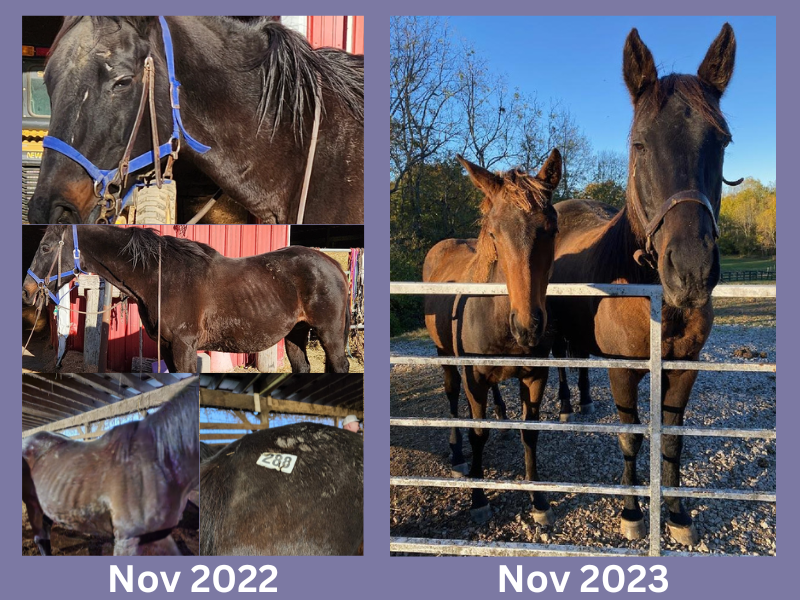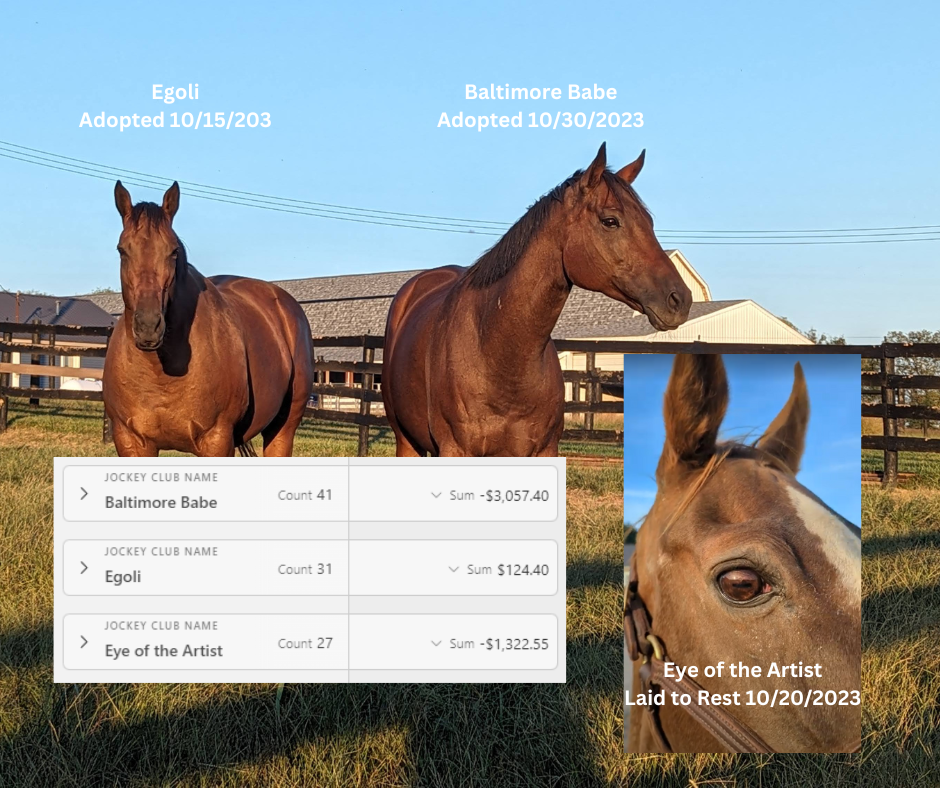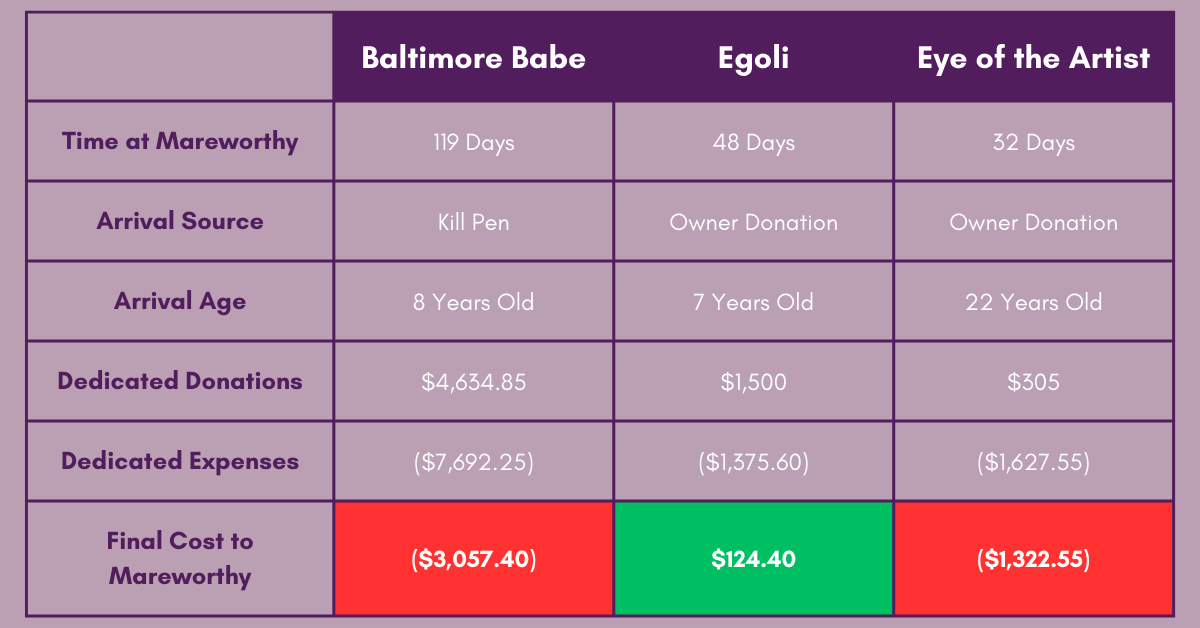Life After the Kill Pen: Now a nanny, Thoroughbred broodmare retiree Grisham has beaten the odds11/9/2023 This is the story of one Thoroughbred broodmare retiree. To many in the racing and breeding industry, hers is a typical tale that varies only in a few details from the mundane life narrative of thousands of other mares. Like so many Thoroughbreds, Grisham started as a pinhook, waged a racing campaign, served a long broodmare career, and eventually reached an uncertain retirement.
But, only weeks away from turning a quarter-century, and only a year removed from an ambiguous fate while relegated to an auction kill pen, Grisham has a story with a few surprises. Born in 1999, when the U.S. foal crop numbered 33,844—almost precisely twice the expected foal count in 2023—Grisham never broke into the upper echelons of the sport. Nevertheless, she has lived a life of beating the odds, if only slightly.
0 Comments
Horse rescue is a labor of love, teeming with moments of triumph and heart-wrenching tragedies that tug at the soul. The passion to save these majestic creatures often intersects with financial hurdles, difficult choices, and the ongoing battle to provide a safe haven for equines in dire need. Amidst the successes of adoptions, the struggle to cover expenses that often exceed donations, the devastating impact of tragic accidents leading to euthanasia, and the ethical decisions in handling horses in critical conditions, there lies a beacon of hope in transitioning horses to responsible non-profits like Mareworthy Charities. October certainly had its share of triumphs and a big tragedy for us. Egoli and Baltimore Babe both left for their adoptive homes with the hopes of returning to Kentucky next October to compete in the Retired Racehorse Project Thoroughbred Makeover, and we had to say goodbye unexpectedly to Eye of the Artist after she slipped in her paddock resulting in a herniated diaphragm. Successful adoptions bring immeasurable joy and hope to the world of horse rescue. Witnessing a once-neglected or abandoned horse find a loving forever home is a testament to the dedication and hard work of rescue organizations. These moments remind us that every effort, every penny, and every sleepless night are worth it. However, these triumphs are not without their challenges. The financial burdens in horse rescue are often substantial. The expenses of proper care, veterinary treatment, rehabilitation, and general upkeep of rescued horses can surpass the available donations. It's a constant battle to balance the books while ensuring every horse receives the care it deserves. Tragic accidents leading to irreversible injuries or illnesses sometimes force the agonizing decision of euthanasia. It's a heartbreaking reality faced by many rescues, often with limited resources. In such moments, the emotional toll on caretakers, volunteers, and supporters is immeasurable. One of the toughest decisions in horse rescue involves prioritizing which horses to help. There are instances where limited resources lead to deliberations about whether to aid a horse in critical condition or to focus on preventing multiple horses from ending up in dire situations like kill pens. The ethical dilemma of using funds to save one horse or to support preventative measures for many others is a constant moral quandary. When we look at the expenses incurred by Baltimore Babe compared to Egoli, there is a glaring issue we have to take into consideration: we could have re-homed 5.6 Egoli's for the same financial expenses as Babe ($7,692.25 / $1,375.60 = 5.592). Why is that? Egoli arrived to us in excellent health and condition with her full medical history directly from her Thoroughbred industry connections less than 20 minutes from our farm while Babe came from a kill pen in Louisiana in poor physical condition without any records from her medical history. Egoli arrived with a financial donation from her previous owners and a minimal transport fee while Babe had a $2,500 bail plus quarantine and a $1,600 trailer ride from Louisiana to Kentucky. This is where the importance of transitioning horses to responsible non-profits like Mareworthy Charities before they reach critical conditions shines through. Such a proactive approach not only provides the horse with a better chance of finding a new home but also alleviates the financial strain on non-profits. By transitioning a horse before its situation becomes dire, the chances of successful rehabilitation and rehoming significantly increase, while the financial burden on the organization is lessened. Additionally, it's important for organizations to focus our efforts on supporting our immediate communities first not only because it's the best way to grow our support but also because it makes the most financial sense. Mareworthy Charities, along with other responsible non-profits, play a pivotal role in providing a safety net for these animals. Their focus on preemptive care and transition services can mean all the difference in a horse's life. By supporting and working alongside these organizations, the horse rescue community can strive to lessen the tragedies and celebrate more triumphs. In conclusion, the world of horse rescue is a rollercoaster of emotions. While it is brimming with triumphs in successful adoptions, it is also marred by tragedies, financial struggles, and tough decisions. Transitioning horses to responsible non-profits before they reach critical conditions emerges as a pivotal strategy, offering a lifeline to these magnificent animals and a more financially sound approach for the organizations that rely on donations. It's a collective responsibility to support these initiatives and make a difference in the lives of these incredible creatures. If you have a Thoroughbred mare within a few hundred miles of Central Kentucky who you are considering rehoming, please reach out to talk about options. You can contact us at [email protected] or by phone at (859) 212-9118. If your mare is located outside our immediate service area, we are still happy to help through our network. Line Item Records for Horses with Outcomes in October 2023 Baltimore Babe: Adopted October 30, 2023 Egoli: Adopted October 15, 2023 Eye of the Artist: Laid to Rest October 20, 2023 |
|
|
Scan or Click the QR Code to Donate
|
Questions? Email [email protected]
|
Mareworthy Charities is a 501(c)(3) nonprofit organization. Its tax identification number is 88-4420958



